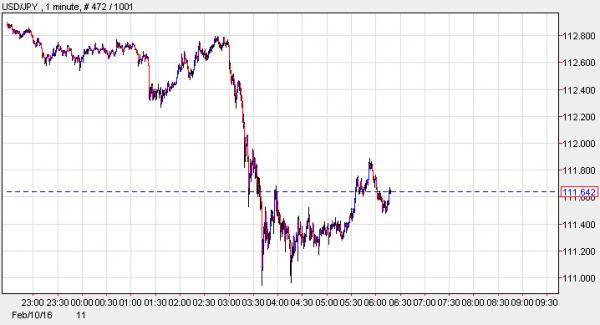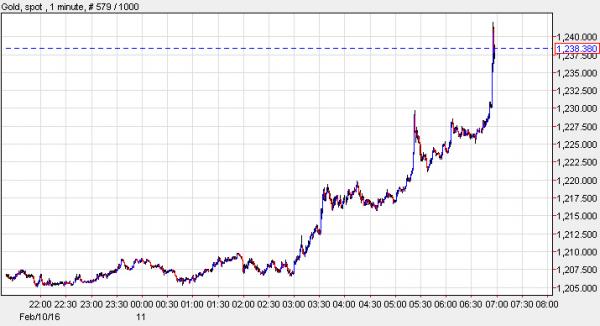Yesterday morning, when musing on the day’s key event namely Yellen’s congressional testimony, we dismissed the most recent bout of European bank euphoria which we said “will be brief if not validated by concrete actions, because while central banks have the luxury of jawboning, commercial banks are actually burning through funds – rapidly at that – and don’t have the luxury of hoping for the best while doing nothing.” This morning DB has wiped out all of yesterday’s gain.
As for Yellen’s testimony, we said that “she can send stocks reeling with one word out of place” – the word in question being not what she said but what she didn’t say, in this case not being dovish enough and thus supportive enough of risk. And the consequence is there for all to see as soon as their trading terminal boots up: everything is crashing (with the exception of China which is on holiday, and Japan which was mercifully closed yesterday). Here are the highlights:
It all started in Hong Kong where as we reported last night, the Hang Seng Index plunged 3.9%, catching up with the week’s selloff as the market reopened from a holiday, and capping its worst Lunar New Year start since 1994.
Japan’s Nikkei Stock Average and China’s Shanghai Composite Index were both closed, but investors continued to pile into the yen, as virtually every carry trade has fallen apart in the past month. As a result, the dollar was down 1.8% against the yen at ¥111.28 after sliding below 111 briefly, a massive gain of nearly 300 pips in the past 24 hours, sending the Yen to the lowest level since October 2014 when Kuroda expanded QE.

In the first 9 days of this month, the Yen has risen 985 pips: That is biggest advance, in pip terms, since Oct. 1998; that month, the currency rose 1,563 pips from 130.03 to 114.40 over nine trading days ended Oct. 19. Elsewhere, the euro was up 0.4% against the dollar at $1.1325, its highest since October.
It wasn’t just FX: European stocks slid toward their lowest since September 2013 and U.S. futures indicated equities will open nearly 2% and put the recent support level of 1812 in danger of being breached.
Among the key European movers was Societe Generale which tumbled 12% after reporting that quarterly profit missed estimates as earnings at the investment bank fell and it set aside provisions for potential legal costs.Elsewhere, Rio Tinto Group slipped 4.1% as it scrapped its progressive dividend policy and set out new spending cuts.
“Financial markets are repricing for a global growth slowdown,” said Tim Condon, head of Asian research at ING Groep NV in Singapore. “Expectations that monetary policy would be able to do much have diminished considerably.”
Just as troubling is that Swedish shares slid and the OMX Stockholm 30 Index dropped 3.% despite Sweden’s central bank going even deeper into NIRP, cutting its interest rate from -0.35% to -0.5%, lower than the expected -0.45%. The yen leaped to its highest in more than a year. Major sovereign bond markets rallied, pushing U.K. gilt yields to a record low. Gold rose beyond $1,200 an ounce, while U.S. oil traded below $27 a barrel.
This is troubling, because as Bloomberg notes, “signals by central banks from Europe to Japan that additional stimulus is at the ready are failing to ease investor concern that global growth will keep slowing.” This means that it is no longer just a joke that central banks are losing credibility: judging by the markets’ reaction it is all too real. To this point, yesterday we wondered if Yellen will make bad news good news again. She has failed:
“Over the last few years when we got bad news, equity markets would rally because they would interpret this as potential for central banks to go more dovish,” said Mohit Kumar, head of rates strategy at Credit Agricole SA’s corporate and investment bank unit in London. “Now that correlation is shifting to bad news is actually bad news. Investors are concerned over central banks’ policy options given the market is driven by factors over which they have little or no control over.”
Imagine that: investors investing without a central bank to hold their hand.
Among other things crashing: bond yields – the 10Year plunged to 1.62%, the lowest level since May 2013 as the entire treasury complex prepares for NIRP.
Not everything was crashing however: as central planners lost control, the dull, boring yellow metal known as gold was up about 4% overnight and was trading at $1240 moments ago, well above the level it hit when the Fed ended QE3, and outperforming every asset class in that time period.

Also surging are peripheral European yields, most notably in Portugal and Greece both over 30 bps wider, as suddenly 7 years of financial dirt kicked under the rug thanks to central bank jawboning and futile actions, re-emerges for all to see, and to be reminded that nothing was ever fixed!









Leave A Comment